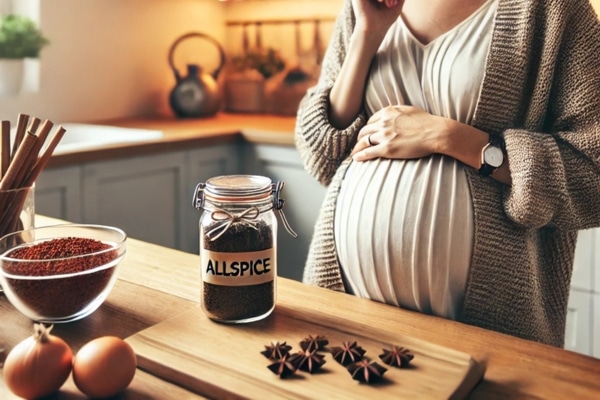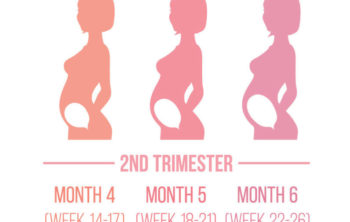Contents
Can Pregnant Women Have Allspice? A Comprehensive Guide
Allspice, also known as Pimenta dioica or Jamaican pepper, is a popular spice known for its warm, aromatic flavor. Often described as a combination of cinnamon, cloves, nutmeg, and pepper, allspice is a versatile ingredient used in both sweet and savory dishes. But if you’re pregnant, you might wonder, “Can pregnant women have allspice?”
The answer isn’t black and white, as the safety of allspice during pregnancy depends on how it’s used, the quantity consumed, and individual health factors. In this article, we’ll explore the benefits, risks, and safe practices for consuming allspice during pregnancy to help you make informed decisions.

What Is Allspice?
Allspice is a dried berry from the Pimenta dioica tree, native to the Caribbean and Central America. Despite its name, it’s a single spice rather than a blend. Its unique flavor profile makes it a common ingredient in:
- Baked Goods: Gingerbread, pumpkin pie, and cookies.
- Savory Dishes: Marinades, stews, and jerk seasoning.
- Beverages: Mulled wine, cider, and herbal teas.
Allspice also has a long history of use in traditional medicine, where it’s valued for its warming and digestive properties.
Is Allspice Safe During Pregnancy?
The short answer is yes, allspice is generally safe for pregnant women when used in moderation as a culinary spice. However, concentrated forms such as essential oils or medicinal doses may pose risks and should be avoided.
Safe Amounts of Allspice During Pregnancy
- Cooking and Baking: A few teaspoons of ground allspice used in recipes are safe.
- Essential Oils: Should be avoided due to their high potency.
Benefits of Allspice During Pregnancy
When consumed in small amounts, allspice offers several health benefits that can support a healthy pregnancy.
1. Supports Digestive Health
Pregnancy often comes with digestive challenges like bloating, indigestion, and constipation. Allspice can help:
- Reduce Gas and Bloating: Its carminative properties alleviate gastrointestinal discomfort.
- Stimulate Digestion: Encourages the production of digestive enzymes.
Tip: Add a pinch of allspice to teas or soups to aid digestion.
2. Rich in Antioxidants
Allspice contains powerful antioxidants such as eugenol, which can:
- Protect cells from oxidative stress.
- Support overall immune health during pregnancy.
3. Eases Morning Sickness
The warm, spicy aroma of allspice may help soothe nausea and reduce symptoms of morning sickness.
4. Boosts Circulation
Allspice’s natural warming effect promotes healthy blood flow, which can help reduce pregnancy-related swelling and fatigue.
5. Natural Anti-Inflammatory
Compounds in allspice, such as eugenol, possess anti-inflammatory properties that may help alleviate joint pain and muscle aches during pregnancy.
Risks of Allspice During Pregnancy
While allspice has many benefits, there are some risks to consider, especially when used in concentrated forms.
1. Potential Uterine Stimulation
In high doses, allspice has been traditionally believed to stimulate uterine contractions. Although this is not well-documented in scientific literature, it’s better to err on the side of caution.
Recommendation: Avoid using large amounts of allspice or consuming allspice essential oil.
2. Allergic Reactions
Some individuals may be sensitive to allspice, leading to symptoms such as:
- Skin irritation.
- Digestive upset.
If you’ve never consumed allspice before, start with a small amount and monitor for adverse reactions.
3. Interaction with Medications
Allspice contains eugenol, which may interact with certain medications, including:
- Blood Thinners: Eugenol has blood-thinning properties that could amplify the effects of anticoagulant medications.
- Pain Relievers: May interact with nonsteroidal anti-inflammatory drugs (NSAIDs).
Advice: Consult your doctor if you’re on medication and plan to use allspice regularly.
How to Use Allspice Safely During Pregnancy
If you’d like to enjoy allspice while pregnant, follow these tips to ensure it’s used safely:
1. Stick to Culinary Amounts
Use allspice as a flavoring agent in cooking and baking rather than taking it in medicinal doses or as a supplement.
2. Avoid Essential Oils
Allspice essential oil is highly concentrated and should not be used during pregnancy due to its potency.
3. Combine with Other Safe Ingredients
Pair allspice with other pregnancy-safe spices like cinnamon, ginger, and nutmeg for flavorful and balanced dishes.
4. Monitor for Side Effects
If you experience any adverse reactions, such as nausea or skin irritation, discontinue use and consult your healthcare provider.
Pregnancy-Friendly Recipes Featuring Allspice
Here are some simple and safe ways to incorporate allspice into your pregnancy diet:
1. Pumpkin Spice Oatmeal
Ingredients:
- 1 cup rolled oats.
- 1/2 teaspoon ground allspice.
- 1/2 teaspoon cinnamon.
- 1 tablespoon honey or maple syrup.
- 1/2 cup milk (or plant-based alternative).
Instructions:
- Cook oats in milk until soft.
- Stir in allspice, cinnamon, and sweetener.
- Top with fresh fruit or nuts.
2. Allspice-Infused Apple Cider
Ingredients:
- 4 cups apple cider.
- 1 teaspoon ground allspice.
- 2 cinnamon sticks.
- 4–5 whole cloves.
Instructions:
- Simmer all ingredients in a pot for 10–15 minutes.
- Strain and serve warm.
3. Allspice Banana Bread
Ingredients:
- 3 ripe bananas.
- 1 teaspoon ground allspice.
- 1 teaspoon cinnamon.
- 1/2 cup sugar.
- 1 1/2 cups flour.
- 1/3 cup melted butter.
Instructions:
- Mash bananas and mix with butter and sugar.
- Stir in dry ingredients, including allspice and cinnamon.
- Bake at 350°F (175°C) for 50–60 minutes.
Frequently Asked Questions (FAQs)
1. Is allspice safe in the first trimester?
Yes, when used in small amounts for cooking, allspice is safe during the first trimester. Avoid high doses or supplements.
2. Can allspice cause miscarriage?
There is no scientific evidence to suggest that culinary amounts of allspice can cause miscarriage. However, large doses or essential oils should be avoided as a precaution.
3. Is allspice tea safe during pregnancy?
Yes, allspice tea made with a small amount of ground allspice is generally safe. Avoid overconsumption and check with your doctor if you’re unsure.
4. Which type of allspice is best during pregnancy?
Ground allspice or whole allspice berries used in cooking are safe. Essential oils and concentrated extracts should be avoided.
5. Does allspice interact with prenatal vitamins?
No known interactions exist between allspice and prenatal vitamins. However, consult your healthcare provider if you’re concerned.
6. How much allspice is too much during pregnancy?
Stick to 1–2 teaspoons of ground allspice per day in recipes to ensure safe consumption.
7. Is allspice good for morning sickness?
Yes, the warm aroma of allspice can help reduce nausea and ease morning sickness.
8. Can allspice be used in desserts during pregnancy?
Absolutely! Allspice is commonly used in pregnancy-safe desserts like pies, cookies, and banana bread.
9. Is allspice gluten-free?
Yes, allspice is naturally gluten-free, but check packaging for potential cross-contamination.
Allspice’s circulation-boosting properties may help reduce mild swelling during pregnancy.
Conclusion
Allspice is a safe and flavorful addition to a pregnant woman’s diet when used in moderation. It offers numerous health benefits, including improved digestion, reduced inflammation, and a boost in circulation. However, pregnant women should avoid concentrated forms like essential oils or large doses, as these may pose risks.
By sticking to culinary amounts and consulting your healthcare provider if you have concerns, you can enjoy the rich flavor and health benefits of allspice throughout your pregnancy.
Would you like more pregnancy-safe recipes or tips on using spices during pregnancy? Let us know in the comments below!



